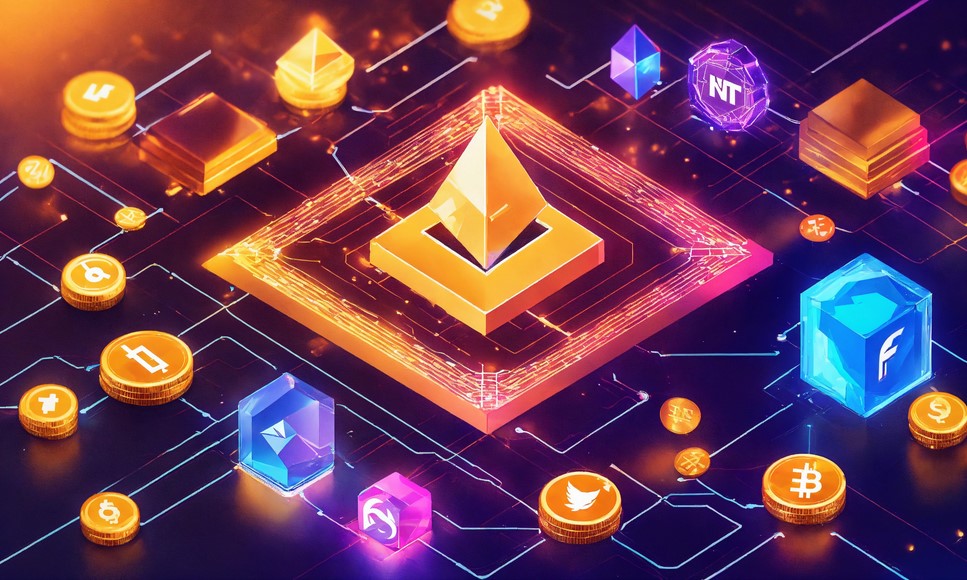Blockchain technology, originally developed as the underlying infrastructure for Bitcoin, has evolved far beyond its initial purpose. This article explores the diverse applications of blockchain technology, its transformative impact on various industries, and the challenges and future prospects of widespread blockchain adoption.
Understanding Blockchain Technology:
Decentralization: Blockchain is a decentralized ledger technology where transactions are recorded across a network of computers. This decentralization eliminates the need for a central authority, enhancing security and transparency.
Immutable Ledger: Once data is recorded on a blockchain, it is nearly impossible to alter, ensuring the integrity and authenticity of the information. Each block in the chain contains a cryptographic hash of the previous block, linking them together securely.
Smart Contracts: Smart contracts are self-executing contracts with the terms of the agreement directly written into code. These contracts automatically execute actions when predefined conditions are met, reducing the need for intermediaries and enhancing efficiency.
Transformative Impact of Blockchain:
Financial Services:
Cross-Border Payments: Blockchain enables faster, cheaper, and more secure cross-border transactions by eliminating the need for intermediaries and reducing settlement times.
Decentralized Finance (DeFi): DeFi platforms leverage blockchain to offer financial services such as lending, borrowing, and trading without traditional banks, providing greater access and transparency.
Asset Tokenization: Blockchain allows the tokenization of real-world assets, such as real estate and commodities, enabling fractional ownership and enhancing liquidity.
Supply Chain Management:
Traceability and Transparency: Blockchain provides end-to-end visibility of supply chains, allowing stakeholders to track the origin, movement, and authenticity of products. This transparency enhances trust and reduces fraud.
Efficiency and Automation: Smart contracts automate and streamline supply chain processes, reducing manual intervention, minimizing errors, and accelerating transactions.
Healthcare:
Medical Records: Blockchain ensures secure and interoperable electronic health records, giving patients control over their data and enabling seamless sharing among healthcare providers.
Drug Traceability: Blockchain enhances the traceability of pharmaceuticals, combating counterfeit drugs and ensuring the integrity of the supply chain from manufacturer to patient.
Voting Systems:
Secure and Transparent Voting: Blockchain-based voting systems offer a tamper-proof and transparent platform for conducting elections, reducing the risk of fraud and ensuring the integrity of the voting process.
Voter Privacy: Blockchain ensures voter anonymity while providing a verifiable and auditable voting record, enhancing trust in the electoral process.
Intellectual Property:
Digital Rights Management: Blockchain enables the secure and transparent management of intellectual property rights, ensuring that creators receive fair compensation and protecting against piracy.
Proof of Ownership: Blockchain provides a verifiable record of ownership and provenance for digital and physical assets, enhancing trust and reducing disputes.
Challenges in Blockchain Adoption:
Scalability: Blockchain networks face scalability challenges, particularly in terms of transaction speed and capacity. Solutions such as sharding, layer-2 protocols, and consensus mechanism improvements are being explored to address these issues.
Interoperability: The lack of interoperability among different blockchain platforms hinders seamless data exchange and collaboration. Developing standards and protocols for interoperability is crucial for widespread adoption.
Regulatory Uncertainty: The evolving regulatory landscape for blockchain and cryptocurrencies poses challenges for businesses and developers. Clear and consistent regulations are needed to foster innovation while ensuring compliance and consumer protection.
Energy Consumption: Some blockchain networks, particularly those using proof-of-work consensus mechanisms, consume significant amounts of energy. Transitioning to more energy-efficient consensus models, such as proof-of-stake, is essential for sustainability.
Security Risks: While blockchain itself is secure, vulnerabilities in smart contracts and blockchain applications can be exploited by malicious actors. Robust security practices and thorough auditing of smart contracts are necessary to mitigate risks.
Future Prospects of Blockchain:
Mainstream Adoption: As blockchain technology matures and overcomes current challenges, its adoption across various industries is expected to increase. Businesses and governments will leverage blockchain to enhance transparency, security, and efficiency.
Integration with Emerging Technologies: Blockchain will integrate with other emerging technologies, such as artificial intelligence (AI), the Internet of Things (IoT), and edge computing, to create more powerful and innovative solutions.
Decentralized Applications (dApps): The development of decentralized applications (dApps) on blockchain platforms will continue to grow, offering users greater control over their data and transactions without relying on centralized intermediaries.
Sustainable Development: Blockchain has the potential to contribute to sustainable development goals by enhancing transparency in supply chains, promoting fair trade, and enabling secure and efficient digital identities for underserved populations.
Enhanced Governance: Blockchain can improve governance and reduce corruption by providing transparent and immutable records of transactions, contracts, and governmental processes, ensuring accountability and trust.
Embracing the Blockchain Revolution
Blockchain technology is transforming industries and enabling new paradigms of trust, transparency, and efficiency. While challenges remain, ongoing advancements and collaborative efforts are paving the way for widespread adoption and integration of blockchain solutions.


